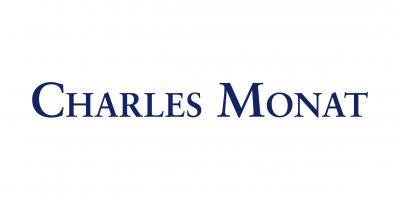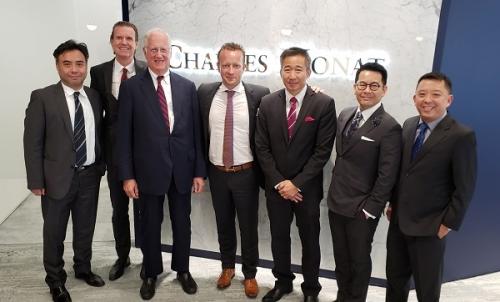Charles Monat Associates: Staying Ahead in the Global Insurance Brokerage Market

Charles Monat of Charles Monat Associates
Apr 22, 2019
A high-level delegation of company leaders from independent insurance brokerage Charles Monat Associates (CMA) arrived at a recent interview with Hubbis to survey the immensely competitive insurance broking market in Asia, to analyse the opportunities and the challenges, explain the company’s offerings and define the firm’s strategy for Asia and beyond.
CMA has in the past five decades established itself as one of the world’s leading brokers for the high-net-worth individuals, and executives of multinational companies. We had the privilege of sitting together with the management team for their first group interview. Those attending the discussion included: Charles Monat, Founder and Chairman; Yves Guélat, Group CEO; Berry Wong, Hong Kong CEO; Martin Wong, Singapore CEO; Simon Lo, International CEO; Klaus Kiessling, Group Chief of Operations; and Nikki Koh, Group Chief Commercial Officer.
As a global premium consultant, CMA has been a pioneer in the development of customised insurance-based solutions since its inception in Hong Kong in 1971 by Charles Monat. The company today has almost 200 staff in international offices spanning Dubai, Hong Kong, Kuala Lumpur, Liechtenstein, Miami, Singapore and Zurich and serves clients in over 50 countries.
The company’s strategic partner is Willis Towers Watson (WTW), one of the world’s leading global advisory, broking and solutions providers.
Taking the helm of the company is Group CEO, Yves Guélat where he began by introducing Mr Charles Monat himself - who is no longer active in the day to day business but sits as Chairman of the Board and continues to consult and maintain relationships with private clients.
“Yes,” said Monat, “I remain highly motivated and have an excellent base of ‘direct’ clients that I have known over the last nearly 50 years in this business and with whom I have trust and chemistry, which are both so vital for this business. I remain passionate about providing genuine service and very fair value.”
Guélat then introduced the newer members of the team. Simon Lo as International CEO, he said, is the firm’s most recent senior hire, having joined in early March 2019 from his previous role as deputy CEO at IPG in Singapore, where he was in charge of the Middle East. Guélat further introduced Martin Wong, the Singapore based CEO who joined the firm in late 2018, where he was previously CEO for JLT Singapore.
“We still today have a great opportunity to provide life and legacy planning insurance products, for people around this region and around the world,” observed Monat, on opening the discussion to focus on the market dynamics and industry outlook.
Keeping assets liquid
“Liquidity is always essential,” he continued, “for example for inheritance tax in many countries, although not in Singapore or Hong Kong where there are no longer estate duties. Liquidity is generally required for continuity of the family, or for keyman insurance in a business. Moreover, as people become wealthier, they usually have more non-liquid assets and insurance creates that necessary liquidity at times of family duress and distress. The market is certainly not saturated, we feel we have great opportunities ahead.”
Guélat reported that in the nearly five decades since the firm was founded, there had been a substantial increase in the number of insurance carriers, as well as far more competition within the insurance business.
Intensifying competition
“We still have only three major brokers in the HNW space,” he says, “but they have hired many new people and competition is intense. The growth of wealth creation globally, primarily in Asia in the last few years, created demand for the business to expand.”
Of course, he acknowledged that the underlying demand had grown, but less so than the competition, and therefore the numbers were clear. “They underline how we must continuously improve the excellence of our service,” he added, “and how we must remain very, very focussed on our partners.”
“Every client of ours has unique family, wealth and business dynamics,” Monat added. “We aim to develop successful and holistic relationships with our clients and business partners at the world’s most respected private banks, accounting firms and insurance carriers.”
Beyond CMA’s traditional borders
Lo shifted the conversation to opportunities outside the region, noting that while China and other Asian markets grab the headlines, it is often easy to overlook the other opportunities. Centres such as Dubai, Zurich, and Miami have always been traditional hubs that are favoured by the High Net Worth Individuals (HNWI) and ultra-HNWI community, and consequently, the firm wants to invest more resources there, as well.
“The needs of the clients, whether in China or Zurich or Miami are essentially similar,” said Lo. “However, in the Middle East things are somewhat different, for example, there are higher geopolitical risks to be factored in.”
Lo explained that the firm is pursuing an official license from the Dubai International Finance Centre for its Dubai Category 4 license. “We are also focusing on Africa,” he adds, “which when we build our Dubai and Zurich operations further, will be easier to access. Overall, the goal is to turn the international piece of business into the third pillar to complement Hong Kong and Singapore.”
Expanding the net
Nikki Koh joined the conversation, explaining that his role is to identify new opportunities to expand the business model. “The mission is to find revenue potential beyond the traditional business, for example, we now increasingly connect to the commercial banks, wealth management firms, tax advisers, law firms and others, trying to find new ways to collaborate. We also have a new licence for Labuan to conduct Malaysia onshore business, as they have a lot of assets both onshore and offshore. And there are also other markets that we have identified that would offer really high potential.”
Nearly five decades young
Martin Wong remarked that the firm is well placed to prosper, being almost five decades mature and having had its share of difficult times in the past, as well as the great times. “Today,” he observed, “we are in a very fortunate position to be very clearly focussed on the opportunities ahead, leveraging the strong foundations and aiming at the full actualisation of what the firm is destined to achieve.”
He expanded on these comments by remarking that the challenge now is to remain entirely relevant to the firm’s private bank partners and to the end clients. “Our clients have assets across many borders,” he noted, “and it is essential for us to keep developing the capability and talents of our people to handle their needs, not primarily in Asia but on a global basis.”
A two-way dialogue
Martin Wong believes a consultative approach with partners and clients is vital to remaining relevant. “These are long-term solutions we offer,” he comments, “so our consultants need to have conversations to help them our partners and clients see the long-term, big picture of these liquidity solutions. The market and the product landscape continue to evolve, for example, we are already in an inverted yield curve scenario which somewhat foretells what is likely to happen in the next 24 to 36 months, meaning protection and preservation conversations are all more relevant. To cite the old adage, people don’t plan to fail, but they do fail to plan.”
He also observed that the private banks have the capacity to engage in discussions with the clients on long-term legacy and planning issues, but not all decide to do so, and some do not achieve as much as they could.
“If a bank chooses not to participate in this type of value-added solution and conversation with clients,” he commented, “we think they not only forego the opportunity, but they are giving up this opportunity to another bank. The reality should be that every bank wants to journey with their client, not just through one lifecycle but to the second generation, the third generation and ideally the fourth.” And insurance is an excellent product for retaining those family connections.
People make the difference
Martin Wong also noted that the people at the firm offer a major differentiating factor. “And the overall construct of the firm,” he said, “provides tremendous agility and the ability to provide tailor-made solutions, both of which offers key competitive advantages.”
Berry Wong offered some views on the North Asia business. “Many new external asset managers are being created,” he reported, “especially with bankers leaving their roles and opening themselves, which offers us an opportunity to expand with them. As to China, we are looking at the right ways to approach that market, as wealth is growing so fast and long-term planning issues are ever more important. In Taiwan as well, by the way.”
Evolving product suite
Berry Wong also highlighted the evolution of the product suite. “There are so many different products in Asia,” he remarked. “Hong Kong in the last 12 months has seen a lot of interest in Variable Universal Life (VUL), and Private Placement Life Insurance (PPLI) and the banks seem increasingly interested in these areas. And there are new products, such as whole of life and annuity products, so our view is that the composition of the product mix will keep changing and we see that some clients can take on several different types of product as well, not just one product. It will certainly not be like the old days of 99% plus universal life.”
Klaus Kiessling observed how the firm’s DNA is to be an intensive, dedicated sales organisation. “If asked, we might say our three priorities for the year ahead are sales, sales, sales,” he quipped. “But joking apart, to support those sales efforts, we have invested in our people, our systems, our skills, and our technologies. For example, our new CRM tool offers the market intelligence we need to get the best information to our salespeople and helps to measure performance.”
Independent again
Kiessling also commented that Charles Monat’s independence is a key feature of the firm’s competitive edge. “We are No. 2 in the market, but we are not a super-tanker,” he said, “we remain agile and flexible, and while we are fully compliant, beyond the tough compliance framework we have in this business, we try not to get bogged down in processes and procedures .”
Margin protection, Kiessling added, also requires the firm to stay lean. “Going paperless is one means of reducing costs and speeding up the interface with the insurers and partners, for example.
Guélat agreed, adding that the firm’s independence allows the company to shape its own future, not to be focused on this quarter or the next quarter. “Of course,” he stated, “we are focused on our margins, and on growth and we are the fastest growing broker in this industry, expanding by 36% last year. Total premium volume placed on behalf of our partners and clients exceeded USD1.3 billion in premium business, through roughly 190 people in seven different locations.”
Private decisions
He added that investment in people is vital, in up or in down markets. “We can do so in any market conditions,” he said, “whereas perhaps for a company which is part of a major business grouping, it might be tougher for them to invest when their markets are weak. We, for instance, decided that despite any tough market situation, we would continue to increase our numbers and skills to help fuel future growth.”
He added that the firm has major ambitions to realise by the time of its 50th anniversary in 2021. “For example, we have invested in additional capabilities, such as our health and wealth approach, being able to advise clients on the insurance side of any medical issues. We are also investing in our social and corporate responsibility policy; in a world where 1% of the population holds 50% of the worldwide wealth, we are passionate about giving back to society. So, we have decided that we have the ambition to save one life through every life insurance policy we place on behalf of client and partners.”
The tough market draws out the best in CMA
Monat drew the discussion towards a close with some more insights into the market’s evolution, noting that the market has grown, the capacity has grown, the products have become a lot more competitive, and there is much better reinsurance, the last of which is making the insurance industry considerably more capital efficient.
Nevertheless, he also conceded that the face price of the products had fallen, and the margins had become extremely thin for the insurers, forcing them to make money by huge volumes of new business and by the quest for greater efficiencies.
“All in all,” he concluded, “the insurance market remains huge, worldwide. Even in developed areas like the United States and Europe, the market is certainly not saturated by any means at the UHNWI or HNWI levels. The opportunity is therefore immense, and I am very optimistic and happy for our people who are achieving well in terms of their careers and remuneration. We are all interested in seeing everyone share the benefit.”

Founder and Chairman at Charles Monat Associates
More from Charles Monat, Charles Monat Associates
Latest Articles






